I found myself working in an odd somewhat hippy coffee shop the other day where the baristas would actually sit around and chat with the patrons. Nutrition and weight loss came up while being chatted up by a particularly odd barista (as weight loss inevitably seems to with me, call it the power of attraction or whatever you’d like) and I shared my before and after picture with her.
“How did you let yourself get to that point?,” she asked innocently enough.
This is a million dollar question. The kind of open ended question that people ask unknowingly. A question that could head in so many directions. Over the course of the last two years, at Tips of the Scale we have heard all kinds of perceived initial triggers for obesity including:
- the ending of a relationship.
- clinical depression.
- going away to school.
- just having access to bad foods.
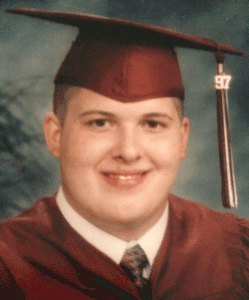
For me, I’ve struggled with obesity my entire life. I was born above average weight and my parents always taught me to strive for the top, I just didn’t realize that they didn’t mean top circumference as well.
This barista’s question reminded me of another I was asked recently:
“Do you think obesity was a cause or an effect?”
What an incredible question.
The interviewer understood my predicament. I had been fat and I was unhappy and unfulfilled. After I got healthy, I took the opportunity to seek professional help to deal with my mental issues. I had deep moral and spiritual conflicts with the church I belonged to and after losing weight, I had the courage to walk away from what I felt is a false religion. I walked away from destructive relationships and friendships. I entered a rebound relationship that my counselor immediately diagnosed as dependent and poor for my mental health and I eventually found the strength to walk away from that as well. I’ve reestablished my relationship with God and connected with Him again on a spiritual level that feels true and right for the first time in forever. I feel happy and fulfilled emotionally as well.
There’s this saying that smart people like to use when analyzing scientific studies that “correlation is not always causation.” In other words, just because two things occur together doesn’t mean that one caused or resulted from the other. For example, the last time it started raining, I was wearing jeans. I could erroneously say that it started raining because I was wearing jeans, but we know that isn’t true.
So what’s the answer? Was obesity my cause or my effect? Or was it an independent issue? Did breaking fat change anything? What should I eat first: the chicken or the egg (sorry for that tangent, it’s breakfast time as I write).
Charles Duhigg in his great recent book The Power of Habit takes a good hard look at what he refers to as the “Habit Loop”.
He identifies three parts in the loop:
- Cue: What “causes” us to do something.
- Routine: The thing we do, the habit.
- Reward: What we get from the habit (i.e. endorphins, joy, fulfillment, etc.).

T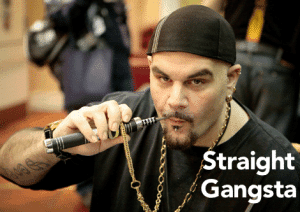 ypically when trying to disrupt this pattern, a person will focus on just ending the routine by quitting the habit cold turkey with good old fashioned willpower (how successful do you think that is?). Occasionally, we’ll try and find a way to get a similar reward from it (think nicotine patches or those weird looking e cigarette things). Other times we may focus on avoiding the cue altogether like an alcoholic avoiding the bar or the pool hall.
ypically when trying to disrupt this pattern, a person will focus on just ending the routine by quitting the habit cold turkey with good old fashioned willpower (how successful do you think that is?). Occasionally, we’ll try and find a way to get a similar reward from it (think nicotine patches or those weird looking e cigarette things). Other times we may focus on avoiding the cue altogether like an alcoholic avoiding the bar or the pool hall.
Duhigg suggests a different and proven process (he provides evidence, read the book if you’re interested in that kind of stuff).
1) Find the routine
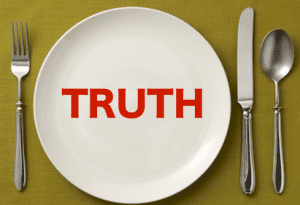 In the case of obesity, this is probably easy. You eat too much and/or the wrong* things. If you think your obesity is caused by the fact that you’re “different” (slow metabolism or genetics), please don’t be offended when I tell you you’re almost definitely not. If you’re not ready to admit that, you won’t get anything out of this blog other than anger anyway. That’s cold hard reality.
In the case of obesity, this is probably easy. You eat too much and/or the wrong* things. If you think your obesity is caused by the fact that you’re “different” (slow metabolism or genetics), please don’t be offended when I tell you you’re almost definitely not. If you’re not ready to admit that, you won’t get anything out of this blog other than anger anyway. That’s cold hard reality.
And it’s not sugar coated. So it’s paleo. Eat it. Or don’t and stay the same.
The choice is yours but I hope you’ll keep reading because the best is yet to come.
*note: by wrong things, I don’t mean morally. Food isn’t bad or evil**. I am of the belief that we should focus our food choices on nutrient dense foods as much as possible.
** second note: Doritos are evil in the sense that they were made by Satan himself in a partnership with Disneyland (no one ever mentions Satan in these articles, it’s more of a private unsubstantiated theory).
2) Experiment with rewards
Why are you eating too much or wrong things? Is there any way you can get the same reward out of something else? Do you find yourself overeating when bored or in social situations? If it’s boredom, maybe the answer is rewarding yourself by going shopping (this can get expensive) or golfing or reading or another hobby.
When you catch yourself feeling the urge to overeat, try different routines and see if they give you the reward you’re looking for. Then wait fifteen minutes and jot down the three words or feelings that pop into your head. This will help you know if you’re getting the same or adequate rewards from the new routine.
By messing around with different routines, you can figure out what the food is actually doing for you and if you can duplicate it with something healthier.
3) Isolate the cue
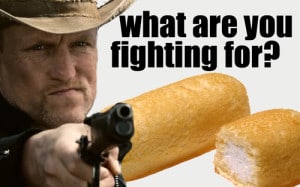
This is one of the most challenging parts of the process because there are so many variables that are hitting us every single time we go to overeat or perform any routine. The goal here is to figure out what factor(s) is/are really making you overeat. Next time you feel the urge to binge or tie off and grab a Twinkie (or eat your go-to nutritional crack, ask yourself some questions:
- What time is it?
- How are you feeling? Stressed, sad, angry, etc.?
- Where are you?
- Who are you with?
- What are you doing?
- What action preceded the urge?
Write out the answers to these questions every time you feel the urge to help you realize what is going on when you’re feeling them. Is it only when you’re with a certain friend? At a certain place? Maybe you feel the cue every day between 8–9pm? Maybe only when you’re alone (this was my problem, I was a closet eater and had to find other things to occupy my alone time).
This brings us to Duhigg’s final step:
4) Make a plan
You know what’s triggering your habit (the cue), the habit you want to change (the routine) and the benefit you get from doing it (the reward). In my case, my habit loop looked like this:
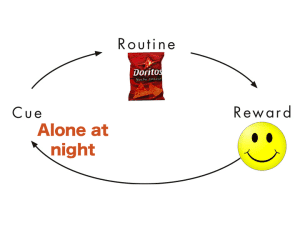
Avoiding the cue isn’t often feasible. If your binging is time based, I guess you could pay someone to hypnotize yourself to black out every day at 3pm but that’s probably not practical (and if you take this route, please message me and take video). For me, I have to be alone sometimes, so how do I find a new routine that triggers my reward of not being bored? This is what I do today:
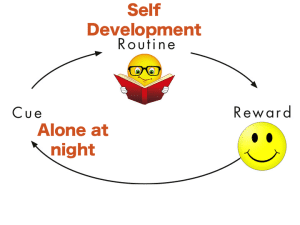
For me, this development takes several forms: writing, studying or learning a new passion or talent. Sometimes it’s even a workout. Changing a habit takes work and you can choose to work smart or you can choose to work hard. There is no magic pill or magic habit, but by better understanding the way you’re wired, you can make intelligent decisions that change your habit loop. In pursuing new things I take a lot of inspiration and process from Tim Ferris and his zeal for trying new things.
Are you ready to make a change? Try taking this process to better understand and hack your habit loop. I’d love to hear how you do or if I can help in the comments.
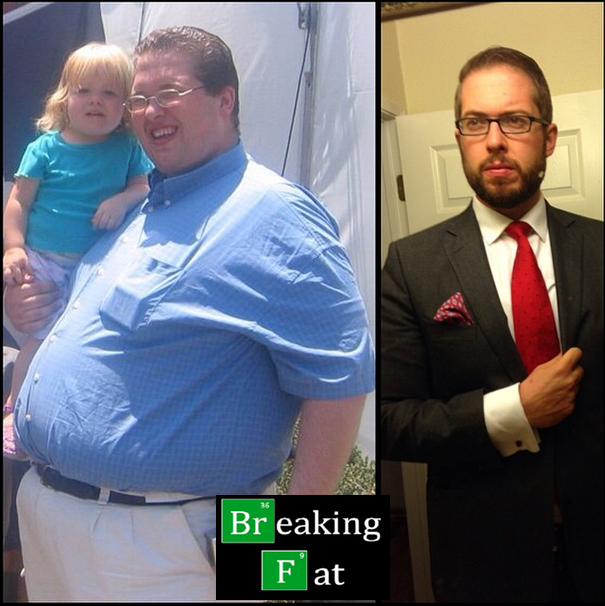
 “TinierTim” Bauer works in marketing as a professional storyteller who also teaches others to tell their stories. He is a father of two beautiful girls, aged 8 and 5. He lost his first 200 pounds in just 374 days and his greatest accomplishments include running his first triathlon 18 months to the day from starting his journey, having his weight loss described by his then 6 year old daughter as a “metamorphosis” (he’s a butterfly now) and the fact that his daughters are now able to sit in his lap without his belly getting in the way and wrap their arms completely around him. He blogs at TinierTim.com and can be found anywhere people are being Social @TinierTim including
“TinierTim” Bauer works in marketing as a professional storyteller who also teaches others to tell their stories. He is a father of two beautiful girls, aged 8 and 5. He lost his first 200 pounds in just 374 days and his greatest accomplishments include running his first triathlon 18 months to the day from starting his journey, having his weight loss described by his then 6 year old daughter as a “metamorphosis” (he’s a butterfly now) and the fact that his daughters are now able to sit in his lap without his belly getting in the way and wrap their arms completely around him. He blogs at TinierTim.com and can be found anywhere people are being Social @TinierTim including 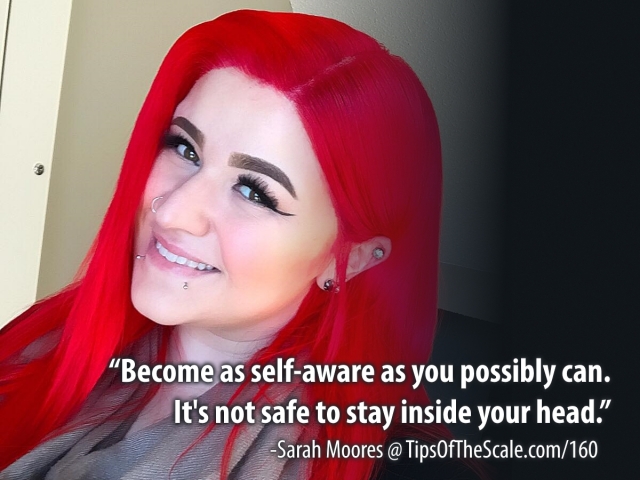
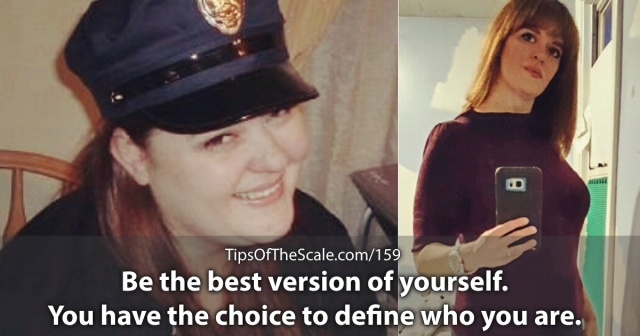
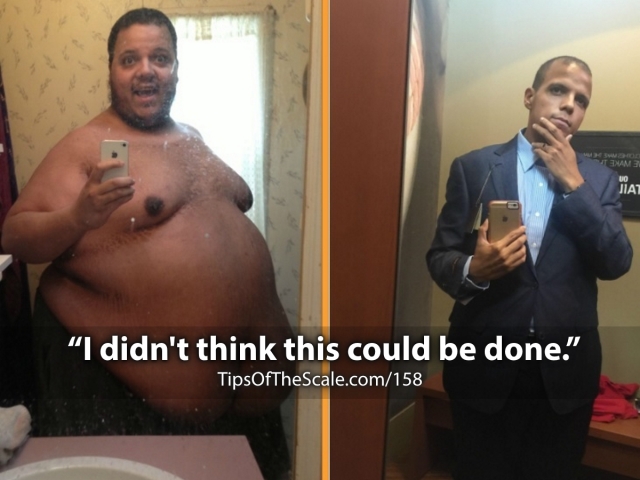
You must be logged in to view comments.